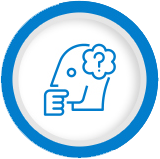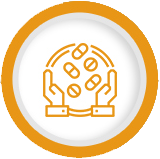Benzodiazepines & Mental Health
What Are Benzodiazepines?
Benzodiazepines, also called benzos, are prescription medications, such as tranquilizers, that act as sedative or depressants, to slow down the central nervous system. The Benzodiazepine mechanism of action enhances your brain’s response to a neurotransmitter known, as Gamma amino butyric acid (GABA). Benzodiazepine are often used to treat anxiety, sleep disorders and other medical conditions.
Benzos are classified into three types: short-acting, medium-acting and long-acting. Short-acting and medium-acting benzodiazepine are effective in the treatment of insomnia. Whereas, long-acting benzodiazepine are effective in treating anxieties.
Benzodiazepines are largely considered safer and most effective for use on a short-term basis, as long-term use may lead to drug dependence and adverse behavioural symptoms. Nevertheless, occasional symptoms like aggression, drowsiness, loss of libido and cognitive impairment may occur, even with short-term use.


How Do Benzos Affect Mental Health?
Mental health refers to cognitive, behavioural and emotional well-being. Having a good mental health thus means that you are able to think rationally on your own, feel what you need to feel in any given situation, and act appropriately in the situations you find yourself in. Mental health is defined by the WHO (World Health Organization) as:
“A state of well-being, in which every individual realizes his or her own capabilities, can cope with the normal stresses of life, can work productively and fruitfully, and is able to make a contribution to his or her community”.
Good mental health is often seen as synonymous with the absence of a mental illness. However, WHO emphasizes that mental health is not just the absence of mental disorder. According to health professionals everyone, regardless of age, gender, social status or ethnic background, has the ability or potential to develop mental health problems.
The tendency to abuse and become addicted to benzodiazepines is due to their chemical composition and action in the body. Tolerance to Benzodiazepines builds up over time and brain chemistry levels change. Research has shown that benzodiazepine intake can cause dopamine levels to surge. This floods the brain with GAMA2.
There is a well-documented connection between the long-term use of benzos and cognitive impairment.
- none Easy
- none Confidential
- none Lifetime Support
Benzodiazepines & Other Medications
It is common for benzodiazepine to be taken in combination with other drugs. Many medications can interact badly, when combined with benzodiazepine and cause unintentional overdose or even death. Deaths due to Benzos alone are very rare, but drug interactions can be very dangerous for mental and physical health. When people with a history of abusing opioids, alcohol, and barbiturates take benzodiazepine, it can heighten their sedation, impair their motor coordination and lead to other life-threatening effects.
Antidepressants, antibiotics, oral contraceptives and antifungal agents, can reduce the rate of elimination of the benzodiazepines, metabolized by CYP450. This can result in excessive drug accumulation and amplify the side effects of the drugs. While medications like phenytoin, St Johns wort, and rifampicin increase the elimination of benzodiazepine and reduce its potency.
Antacids also reduce the rate of absorption of benzos from the intestine. The interactions of antacids and benzos can be controlled by waiting a few hours between taking doses.
Other medications, herbs, and foods that can interact, when combined with benzodiazepine include:
- Certain antifungals
- Certain calcium channel blockers
- Antihistamines
- Cough medicine
- Anticonvulsants
- Other sedatives
- Grapefruit


Benzodiazepine Addiction & Abuse
Benzodiazepine addiction and abuse are major concerns with benzodiazepine treatments. This is partly due to the wide spread availability of benzos and the toxic effect they produce. Benzodiazepine can be chronically abused, leading to addiction and dependence, or accidentally taken in excess leading to an overdose.
Genetics factors can contribute to benzodiazepine addiction and abuse. Socioeconomic and environmental factors, such as unemployment and peer pressure, undoubtedly influence the tendency to abuse benzos as well.
Addiction and abuse of benzodiazepine frequently co-occur with other mental health illnesses, such as anxiety disorders, panic disorders, depression, insomnia, bipolar disorders and antisocial personality disorders. Benzodiazepine should not be used as sedatives for longer than 2 weeks, as the incidence of dependence is significantly higher, after 2-week treatment periods.
Benzodiazepine Use
Benzodiazepines have properties that make them effective, in treating various health conditions. They can function as muscle relaxants and anticonvulsant, as well as sedatives and tranquilizers (relaxing), hypnotics (sleep-inducing), and anxiolytics (anti-anxiety).
At appropriate doses benzodiazepine can be used to stop seizures, treat movement disorders, anxiety, insomnia, and relax muscles. Benzodiazepines can also be given before an anesthetic and used to induce amnesia, for uncomfortable procedures.
For people with problematic anxiety disorders, benzodiazepine can reduce anxiety to a level that they are able to lead a productive and normal life. In anxiety treatments, it can alleviate anxiety without the patient needing to take the drug on a regular basis (only as much as is ‘needed’), without inducing euphoria and with little side effects.

Xanax (alprazolam): this is used in the treatments of anxiety disorders and panic disorder, and sometimes agoraphobia (fear of open spaces), depression, and premenstrual syndrome.
Valium (diazepam): this is used to treat seizures, anxiety, muscle spasms, and alcohol withdrawal, as well as IBS and panic attacks.
Ativan (lorazepam): this is usually prescribed for anxiety. However, it may also be used to treat seizures, IBS, insomnia, alcohol withdrawal, and to help nausea and vomiting in people receiving cancer treatments.
Klonopin (clonazepam): this is prescribed for the treatments of panic attacks and seizures.
Halcion (triazolam) is used as a short-term treatment for insomnia
Restoril (temazepam), estazolam, and flurazepam: These are used for short-term treatments of insomnia.
Tranxene (clorazepate) is used for treating alcohol withdrawal and anxiety disorders, and combined with other medications to control seizures.
Versed (midazolam) is primarily used in children, before medical procedures or surgery.
Librium (chlordiazepoxide) is used for anxiety treatments, alcohol withdrawal, & also IBS.
Oxazepam is used to treat alcohol withdrawal, anxiety and IBS
Addiction is a devastating illness which can put all your relationships and your career in chaos. To help you recover and enjoy life again, we strive to heal both you and your relationships. Call us now to begin the road to recovery today!
Get Help Immediatley, Call Now!

The adverse effect of benzodiazepine depends on the type of medications you are using.
The common short-term side effects include:
- Constipation
- Loss of orientation
- Aggression
- Irritability
- Delusions
- Loss of appetite or increased appetite
- Feeling of depressions
- Muscle weakness
- Diarrhea
- Excitement
- Sedation
- Memory impairment
- Dry mouth
- Dizziness
- Sleep disturbance
- Unsteadiness (common in the elderly, who may have falls and injure themselves as a result)
- Erectile dysfunction
- Transient drowsiness, commonly experienced during the first few days of treatment,
- Fatigue
- Low libido
- Headache
- Unsteadiness
Long term side effects may include:
- Depression
- Anhedonia (the inability to feel pleasure)
- Acute anxiety
- Loss of libido
- Inability to think cohesively
- Weight problems
- Feeling isolated and unreal
- Social phobias
- Agoraphobia (the fear of open or public spaces)
- Loss of confidence
Abusing Benzos
The practice of drug abuse is quite common and so is the abuse of benzos. Some people who are prescribed benzodiazepine for pain or mental health conditions, may unintentionally abuse them and may develop an addiction to the drug. People with a history of drug abuse, may also substitute the experience of a high with benzodiazepine. Abusers also combine benzos with other drugs like opioids, to increase this euphoric effect.
A doctor may prescribe benzodiazepine, but not longer than 10 days, so as to eliminate the symptoms of seizures and panic disorders. The downside of this is, benzos are potent drugs and even using them as directed may lead to an addiction. For instance, Alprazolam (Xanax) and diazepam (Valium) are the most abused drugs due to their rapid onset.
People also abuse benzodiazepine for different reasons which include the following:
Athletes may abuse benzos for recreational use, and often use an overdose in order to experience a high, to alleviate abstinence syndromes of other drugs abuse, and to increase the euphoric effects of illicit drugs like opiates. Example of recreational drugs abused include triazolam, diazepam, midazolam, lorazepam, temazepam and flunitrazepam.
They may occasionally steal from someone’s prescription drugs, because they want to feel calmness or tranquility. The drugs may also be obtained through theft, purchase from illegal sources, or from prescription forgeries.

Since benzodiazepine can be used to impair memory or even abolish functions that normally allow a person to resist aggression or assault, they have been used to commit sexual crime or date rape. Criminals have also been known to use flunitrazepam, to sedate victims, while invading their homes.
Oversedation is a sedative-hypnotic effect of abusing benzodiazepine. People who are experiencing grief over-sedate in order to forget their loss, pain, sorrow or depressive thoughts. Oversedation adds to the accidents on the road and domestic accidents, falls and fractures in the elderly, and acute state of confusions. Symptoms of oversedation are; ataxia, dysarthria, loss of motor coordination, vertigo, drowsiness, diplopia and mental confusion.
Dependence to Benzodiazepines
All benzodiazepines can cause physical and psychological dependence, as they are a schedule IV medication. This is why they are often prescribed for a short period (four weeks). When you suddenly stop the using benzos without consulting your doctor, it can easily increase your withdrawal symptoms. Symptoms of benzodiazepine withdrawal include: muscle tension, anxiety, nausea, muscle spasms, irritability, among others.

Benzodiazepines & Mental Disorders
Mental health wellbeing is important in living a good and healthy life. According to WHO a half of the world’s population is affected by mental illness, making mental health disorders a common illness. Mental health illness affect people’s ability to function properly in a relationship, as well as in the society. Benzodiazepine may be used as medications for mental health disorders, including the following:
Generalized Anxiety Disorder (GAD) is the most common anxiety disorder. Common symptoms of GAD include, muscle tension, fatigue, restlessness, insomnia and excessive anxiety, which may occur for a minimum of 6 months, due to the presence of other mental conditions or substance abuse. Antidepressants (SSRIs/SNRIs) are the leading medications, used for the treatments of GAD. However, when benzodiazepines are administered as an additional treatment for GAD, benzodiazepine address acute symptoms, while antidepressants take effect.
Benzodiazepine hypnotics such as lorazepam and diazepam, prolong the duration of sleep, by reducing the time it takes to fall asleep. However, benzodiazepine hypnotics may result in rebound insomnia, if abused.
Epileptic seizures, which is medically called status epilepticus, is a medical emergency, because a person experiences over 30 minutes of continuous seizure, or two or more seizures, within a short period of time. An intravenous (IV) or rectal benzodiazepine is used for treatments of acute or epileptic seizures, while Valium is typically used to control epileptic seizure disorder, over a long period of time, because it works faster.
Benzodiazepine like chlordiazepoxide and diazepam, may be used for alcohol detoxification and to reduce the effects of alcohol withdrawal.
A panic attack can develop into a full-blown panic disorder, when a person has repeated episodes of extreme fear, which may trigger a fight or flight response. Benzodiazepine such as clonazepam, lorazepam are often the first-line of therapy used to lessen symptoms of panic attack.
Benzodiazepine like diazepam may be used on a short-term, to relieve painful skeletal muscle spasms (like what may transpire from acute lower back pain), by producing muscle-relaxing effects.
On completing treatment we offer lifetime support for your recovery.
Strict client confidentiality policy is in place.
Simply give us a call and we will guide you through the process.
FAQ
What is the strongest benzodiazepine for anxiety?
Ativan (lorazepam) is the strongest prescription for anxiety.
What is the best benzodiazepine for social anxiety?
Klonopin (Clonazepam) is the most effective benzodiazepine for social anxiety.
Can I take benzos for depression?
Yes, but for a short period of time.
Can benzodiazepines harm my child?
Taking benzos while pregnant, can affect your child and may result in a floppy infant syndrome. The newborn may suffer from hypotonia, lethargy, and have breathing and feeding difficulties.
Can I take benzodiazepines while pregnant?
Benzodiazepines like diazepam or chlordiazepoxide, may be used during pregnancy, but for a short period of time and in small doses, to minimize the risks to the unborn child. If you are taking benzos and become pregnant, it is safer to see your doctor.
What is the effect of benzodiazepines on the brain?
Benzodiazepines are meant to be used as a temporary treatment, for mental and physical health problems. Using benzodiazepine for a prolonged period of time, like several months, leads to a likelihood of addiction and abuse, as well as severe withdrawal symptoms, including depression, panic attacks and agoraphobia.





